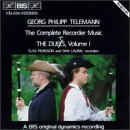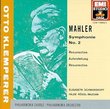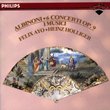| All Artists: Georg Philipp Telemann Title: Telemann: The Complete Recorder Music, The Duets, Vol. 1 Members Wishing: 2 Total Copies: 0 Label: Bis Release Date: 3/25/1994 Album Type: Import Genre: Classical Styles: Chamber Music, Historical Periods, Baroque (c.1600-1750) Number of Discs: 1 SwapaCD Credits: 1 UPCs: 750582015625, 7318590003343 |
Search - Georg Philipp Telemann :: Telemann: The Complete Recorder Music, The Duets, Vol. 1
 | Georg Philipp Telemann Telemann: The Complete Recorder Music, The Duets, Vol. 1 Genre: Classical
|
Larger Image |
CD DetailsSimilarly Requested CDs |
CD ReviewsDon't Spurn the Simple Recorder in the Hands of a Virtuoso Giordano Bruno | Wherever I am, I am. | 08/24/2009 (5 out of 5 stars) "What comes between 'fear' and 'sex'?
If you correctly answered 'fünf', you've solved the oldest and corniest bi-lingual joke in the world. Georg Phillip Telemann (1681-1767) would probably have heard it, and chuckled responsively, sometime during his international travels. Telemann had a more raucous sense of humor -- or perhaps just more opportunity to express it in music -- than his great rivals Bach or Zelenka. Amongst the recordings of his music, you'll find two quite funny operas and several musical slapstick cantatas, of which the funniest is Der Schulmeister. Telemann was enormously prolific and facile, and his surviving output far exceeds Bach's, especially in the category of music written for musicians, for the sheer delight of playing socially. The "Sechs Duetten" for alto recorders without continuo -- known in the musical circles of my youth as the Sex Duets, for reasons I'll leave unspecified -- belong in that category. They're brilliantly conceived to challenge every aspect of a recorderist's technique, demanding fast fingers, fluent tonguing, and tasteful ornamentation. Listening to them is just as pleasurable, assuming that the two recorderists have the chops and play 'into' each other with superb ensemble. The Swedish recorderists Clas Pehrsson and Dan Laurin have the chops -- flaming fingers especially -- and complement each other's phrasing as if they'd played these pieces together dozens of times over years of study, as most likely they have. These duets are what concert muiscians call 'barn-burners' - pieces of intense excitement and display - but they are also primers for serious recorderists in solid technique. If you can play them, and can find someone else who plays them as well as you, you're set for an afternoon or evening of delight. I've been working on some Telemann scores lately for upcoming events, and listening to a lot of Telemann CDs, with increasing respect for the man's genius. The Oxford Dictionary of Music dismisses him with less than a full column listing and the comment that his music has "surface charm rather than depth". That's nonsense, as I intend to show in forthcoming reviews of his sacred cantatas. Telemann was one of those rare composers who could write music at the outer edge of theory for his era, with formidable demands on the players and singers, and yet make it impressive on first hearing and pleasing to audiences of any sophistication." |

 Track Listings (7) - Disc #1
Track Listings (7) - Disc #1



